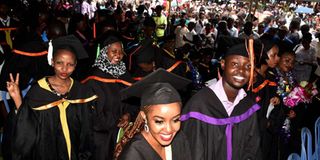What can we say is the role of education in our society?

Graduands at the Technical University of Mombasa (TUM) during the 7th graduation ceremony on November 20, 2019.
What you need to know:
- In normal life, education is seen as the weapon that is used to indoctrinate ideology or dogma.
- Africa with her many social problems, need to embrace the third mission concept to counter politicians from taking the continent into a wrong tangent.
Why is education so important in our society and why do we see it as a right for everyone? This question has troubled me for sometimes. And whenever I try to ask people the same questions, they look perplexed by trying to imagine its importance. In most cases in my view they get it wrong.
Nelson Mandela explained the importance of education, by saying: “Education is the most powerful weapon which you can use to change the world,” he was presumptuous about the weaponisation of education.
In normal life, education is seen as the weapon that is used to indoctrinate ideology (study of ideas or the philosophy of a group of people characteriSed by few educated and large non-educated) or dogma (belief, principle, or statement of opinion, that is considered to be unquestionably true regardless of evidence).
And Confucius is thought to have said, “Education breeds confidence. Confidence breeds hope. Hope breeds peace.”
Learned unemployed youths in Africa will say perhaps Confucius was an optimist in his time and that education has brought nothing to them but despair. Some argue that if they were illiterate, they would not be as frustrated as they are with dogmatic leaders doing things that they know would undermine their future.
And there seems to be a convergence among several leaders in their thinking that education will enrich our brains with new and valuable knowledge that improves our ability to think, analySe, and process the world around us. They also add that education increases our knowledge, and this knowhow unlocks our minds to new ideas, perspectives, beliefs, and cultures. This is a selfish perspective held by many people, but it is blind to the role of education in our social systems.
Link to success
Abdulghani Al-Shuaibi’s worK, The Importance of Education, had an interesting view as to what education should be.
He explained that: “Having education in an area helps people think, feel, and behave in a way that contributes to their success, and improves not only their personal satisfaction but also their community. In addition, education develops human personality, thoughts, dealing with others and prepares people for life experiences. It makes people have a special status in their own society and everywhere they live in”.
Based on Al-Shuaibi’s argument, education is seen to be good for an individual if it impacts the community at large and if it helps us deal with each other and prepares us for life experiences. That is why education is called a system which consists of inputs, the students, the processing, institutions and output, the graduates. In case of any problem, it is the system that require change. Unfortunately, dogmatism is diverting us from the real issues in the country. And there is more focus on political and social issues over economic issues.
Experiences from many countries is such that they avoid an overly prescriptive Constitution. Although neither “woman” nor “sex” are words that appear in the US Constitution, they have made tremendous progress since the first woman, Hattie Caraway was elected to the senate in 1931-1945. The 116th Congress has 26 not because the constitution changed but because the education has had a huge impact.
Currently, universities in the US are under pressure to shift focus from primarily research and teaching and add what they call the Third Mission. This is an emerging phenomenon advocating for a social and economic mission of universities. Although this third mission is not well defined, it however covers such areas as social engagement, knowledge transfer and technology and innovation transfer.
In the past there was a push towards a collaboration between the universities, the policy makers and the private sector popularly referred to as the “Triple Helix”. The relationship did not adequately deal with social issues. Most universities today measure third mission activities as part of their performance reports.
Expectations on universities
Europe too is carefully studying this emerging phenomenon. A recent policy brief in Austria noted that there has been a long history where Higher Education Institutions (HEIs) have been confronted with intensive discussions about their position in society. HEIs have been facing a fundamental paradigm shift about what they are expected to accomplish on an economic, social, and environmental level.
The paper says: “The university is not only responsible for qualifying the human capital (Education – the first mission) and for producing new knowledge (Research – the second mission). Universities must engage with societal needs and market demands by linking the university’s activity with its own socio-economic context”. Universities today must develop their strategies around these three missions.
Africa with her many social problems, need to embrace the third mission concept to counter politicians from taking the continent into a wrong tangent. Since 1964 when the Ominde Commission drafted the first education policy and other subsequent documents, we as a country have never had it right regarding the role of education in our society. It needs to be re-defined starting from universities by developing relevant curriculum and cascade it downwards.
Several studies show that lack of education causes poverty and that most of the extremely poor people lack basic education. But lack of knowledge too contributes to poverty. Is this too difficult for universities to collaborate with the students and effectively deal with scourge of poverty in the country as part of their social obligation?





